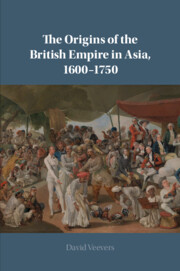Book contents
- The Origins of the British Empire in Asia, 1600–1750
- The Origins of the British Empire in Asia, 1600–1750
- Copyright page
- Dedication
- Contents
- Maps
- Acknowledgements
- Maps
- Introduction
- Part I Weakness and Adaptation
- Part II Subordination and Expansion
- 4 ‘To Be Determined by the Moor’s Justice’
- 5 ‘A Firm Settlement in This Place’
- Part III Limitations and Devastation
- Part IV Empire
- Conclusion
- Bibliography
- Index
4 - ‘To Be Determined by the Moor’s Justice’
Searching for Legitimacy in Mughal Bengal
from Part II - Subordination and Expansion
Published online by Cambridge University Press: 20 May 2020
- The Origins of the British Empire in Asia, 1600–1750
- The Origins of the British Empire in Asia, 1600–1750
- Copyright page
- Dedication
- Contents
- Maps
- Acknowledgements
- Maps
- Introduction
- Part I Weakness and Adaptation
- Part II Subordination and Expansion
- 4 ‘To Be Determined by the Moor’s Justice’
- 5 ‘A Firm Settlement in This Place’
- Part III Limitations and Devastation
- Part IV Empire
- Conclusion
- Bibliography
- Index
Summary
This chapter shifts the focus onto Bengal, and the various strategies adopted by the Mughal empire in accommodating and subordinating the Company’s growing presence in the province of Bengal. If the integration of Company servants into surrounding communities at Madras and their subordination to the sultanate of Golconda unlocked a range of rights and privileges which allowed them to expand their presence on the Coromandel Coast, the opposite was true in Bengal. The English experience in Bengal represented the Company at its most subordinate, pliant and, indeed, weakest, utterly subservient to the communities, elites and rulers whom they relied on. This situation was compounded by the growth of interloping communities, who were even more effective than Company servants in integrating themselves socially, culturally and commercially with Indian communities and elites, assuming many of the subordinate services that Company servants had traditionally fulfilled. Skilful Mughal governors played these groups off against one another, utilising interloping and Company networks for their own benefit, without needing to concede any substantial rights or autonomy to either. In maintaining a plural commercial environment, Mughal elites ensured their place at the top of local hierarchies of wealth and power.
Keywords
- Type
- Chapter
- Information
- The Origins of the British Empire in Asia, 1600–1750 , pp. 111 - 134Publisher: Cambridge University PressPrint publication year: 2020



